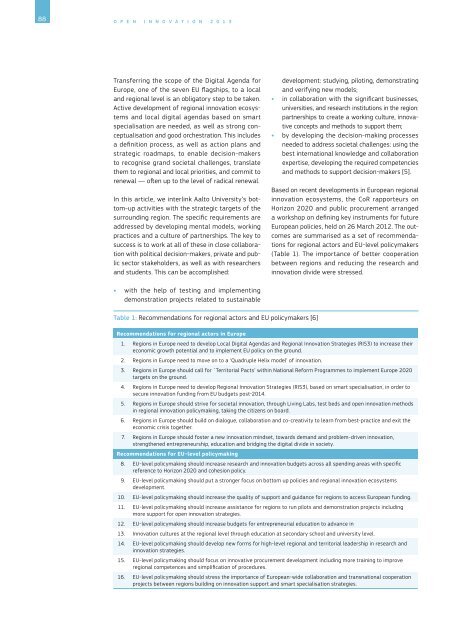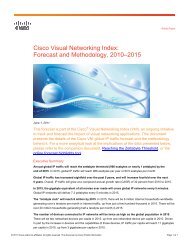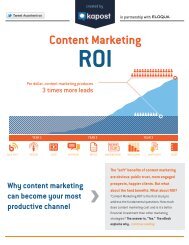Open Innovation 2.0 Yearbook 2013 - European Commission - Europa
Open Innovation 2.0 Yearbook 2013 - European Commission - Europa
Open Innovation 2.0 Yearbook 2013 - European Commission - Europa
Create successful ePaper yourself
Turn your PDF publications into a flip-book with our unique Google optimized e-Paper software.
88 O P E N I N N O V A T I O N 2 0 1 3<br />
Transferring the scope of the Digital Agenda for<br />
Europe, one of the seven EU flagships, to a local<br />
and regional level is an obligatory step to be taken.<br />
Active development of regional innovation ecosystems<br />
and local digital agendas based on smart<br />
specialisation are needed, as well as strong conceptualisation<br />
and good orchestration. This includes<br />
a definition process, as well as action plans and<br />
strategic roadmaps, to enable decision-makers<br />
to recognise grand societal challenges, translate<br />
them to regional and local priorities, and commit to<br />
renewal — often up to the level of radical renewal.<br />
In this article, we interlink Aalto University’s bottom-up<br />
activities with the strategic targets of the<br />
surrounding region. The specific requirements are<br />
addressed by developing mental models, working<br />
practices and a culture of partnerships. The key to<br />
success is to work at all of these in close collaboration<br />
with political decision-makers, private and public<br />
sector stakeholders, as well as with researchers<br />
and students. This can be accomplished:<br />
• with the help of testing and implementing<br />
demonstration projects related to sustainable<br />
Table 1: Recommendations for regional actors and EU policymakers [6]<br />
Recommendations for regional actors in Europe<br />
development: studying, piloting, demonstrating<br />
and verifying new models;<br />
• in collaboration with the significant businesses,<br />
universities, and research institutions in the region:<br />
partnerships to create a working culture, innovative<br />
concepts and methods to support them;<br />
• by developing the decision-making processes<br />
needed to address societal challenges: using the<br />
best international knowledge and collaboration<br />
expertise, developing the required competencies<br />
and methods to support decision-makers [5].<br />
Based on recent developments in <strong>European</strong> regional<br />
innovation ecosystems, the CoR rapporteurs on<br />
Horizon 2020 and public procurement arranged<br />
a workshop on defining key instruments for future<br />
<strong>European</strong> policies, held on 26 March 2012. The outcomes<br />
are summarised as a set of recommendations<br />
for regional actors and EU-level policy makers<br />
(Table 1). The importance of better cooperation<br />
between regions and reducing the research and<br />
innovation divide were stressed.<br />
1. Regions in Europe need to develop Local Digital Agendas and Regional <strong>Innovation</strong> Strategies (RIS3) to increase their<br />
economic growth potential and to implement EU policy on the ground.<br />
2. Regions in Europe need to move on to a ‘Quadruple Helix model’ of innovation.<br />
3. Regions in Europe should call for `Territorial Pacts’ within National Reform Programmes to implement Europe 2020<br />
targets on the ground.<br />
4. Regions in Europe need to develop Regional <strong>Innovation</strong> Strategies (RIS3), based on smart specialisation, in order to<br />
secure innovation funding from EU budgets post-2014.<br />
5. Regions in Europe should strive for societal innovation, through Living Labs, test beds and open innovation methods<br />
in regional innovation policymaking, taking the citizens on board.<br />
6. Regions in Europe should build on dialogue, collaboration and co-creativity to learn from best-practice and exit the<br />
economic crisis together.<br />
7. Regions in Europe should foster a new innovation mindset, towards demand and problem-driven innovation,<br />
strengthened entrepreneurship, education and bridging the digital divide in society.<br />
Recommendations for EU-level policymaking<br />
8. EU-level policymaking should increase research and innovation budgets across all spending areas with specific<br />
reference to Horizon 2020 and cohesion policy.<br />
9. EU-level policymaking should put a stronger focus on bottom up policies and regional innovation ecosystems<br />
development.<br />
10. EU-level policymaking should increase the quality of support and guidance for regions to access <strong>European</strong> funding.<br />
11. EU-level policymaking should increase assistance for regions to run pilots and demonstration projects including<br />
more support for open innovation strategies.<br />
12. EU-level policymaking should increase budgets for entrepreneurial education to advance in<br />
13. <strong>Innovation</strong> cultures at the regional level through education at secondary school and university level.<br />
14. EU-level policymaking should develop new forms for high-level regional and territorial leadership in research and<br />
innovation strategies.<br />
15. EU-level policymaking should focus on innovative procurement development including more training to improve<br />
regional competences and simplification of procedures.<br />
16. EU-level policymaking should stress the importance of <strong>European</strong>-wide collaboration and transnational cooperation<br />
projects between regions building on innovation support and smart specialisation strategies.
















